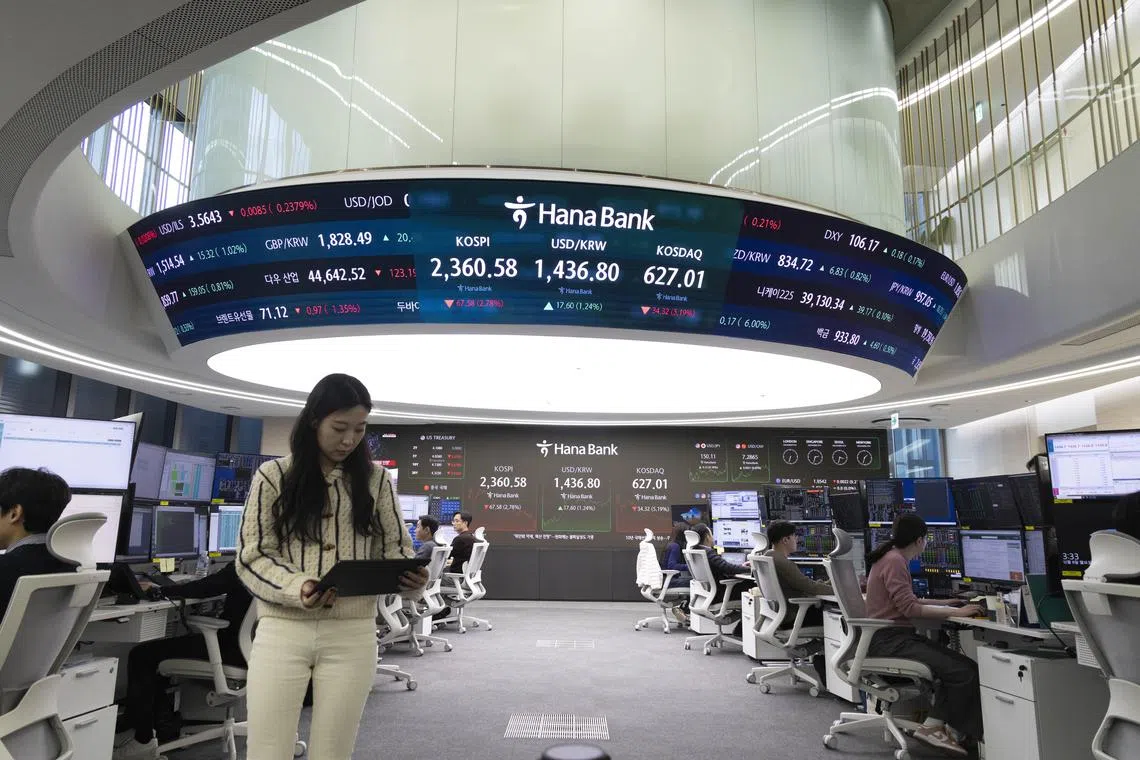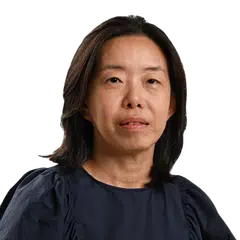News analysis
South Korea’s political crisis poses graver threat to its foreign policy ambitions than the economy
Sign up now: Get insights on Asia's fast-moving developments

From Dec 4 to Dec 6, South Korea’s main stock market index Kospi lost 57 trillion won (S$53.3 billion).
PHOTO: EPA-EFE
Follow topic:
SEOUL - As South Korea reels from the shock of the short-lived martial law debacle of Dec 3, its bureaucrats are racing to stabilise the economy and reassure diplomatic partners of the country’s return to normalcy.
This is as the botched self-coup attempt by President Yoon Suk Yeol
Immediately after the martial law declaration, the Korean won plunged to a two-year low,
In the three days following the debacle, from Dec 4 to Dec 6, South Korea’s main stock market index Kospi lost 57 trillion won (S$53.3 billion), while the smaller Kosdaq dropped 14 trillion won – a combined loss equivalent to the market value of the Hyundai Motor Group, said a Chosun Daily newspaper report.
The panic selling came as investors were already jittery with key trading partner China’s economic slowdown and the prospect of US President-elect Donald Trump’s return to office with his hardline tariff policies.
All diplomatic engagements have been halted while South Korea’s biggest ally, the US – caught on the back foot by the martial law announcement – called it a “bad misjudgment” on Mr Yoon’s part.
While analysts expect that Asia’s fourth-largest economy should be able to ride out the initial bumpiness and withstand any strong impact for the longer term once the situation stabilises, things on the foreign relations front are less rosy.
Without a clear driver in the seat, foreign partners will be reluctant to engage South Korea and decisions of consequence cannot be made, said Dr Troy Stangarone, director of the Hyundai Motor-Korea Foundation Centre at the Washington-based think-tank Wilson Centre.
The country remains in political flux after an opposition-led impeachment motion against Mr Yoon was scrapped on Dec 7 for failing to meet the two-thirds quorum.
After lying low for days after his martial law announcement, Mr Yoon had apologised to the nation
At a press conference on Dec 8, ruling party chief Han Dong-hoon and Prime Minister Han Duck-soo pledged to cooperate closely on state affairs, effectively sharing presidential power, and promised an “orderly” resignation of Mr Yoon
But the opposition has cried foul over such an arrangement.
For that to happen, Mr Yoon needs to either resign or be impeached. However, the PPP is not in favour of either move at this point in time as it would mean a snap presidential election which opposition leader Lee Jae-myung is a shoo-in to win.
The proposed arrangement for the Prime Minister and party chief to share presidential power is a “blatant violation of the Constitution”, said National Assembly Speaker Woo Won-shik.
Mr Lee’s Democratic Party has since said that it is planning to impeach Prime Minister Han too,
While the constitutional legality of the two Mr Hans’ plans remain to be seen, what is clear is the ruling party’s delaying tactic. By delaying Mr Yoon’s departure from office, the party is buying time for Mr Lee’s legal troubles to lead him to possible disqualification from presidential candidacy, and also for the party to build up its candidate at the next presidential election.
As the political deadlock continues, South Korea’s Finance Minister and Deputy Prime Minister Choi Sang-mok has pledged to do his best to arrest any economic fallout for the country.
He held an emergency press conference on the afternoon of Dec 8 to allay fears, affirming that the country’s “economic system remains resilient”, while pledging “bold and swift” action against any excessive volatility in the financial and foreign exchange markets.
“The top priority is external creditworthiness,” the minister stressed, while outlining plans to engage directly with international credit rating agencies and hold briefings to reassure overseas investors.
So far, none of the credit rating agencies has adjusted South Korea’s credit rating.
Describing South Korea’s economy as “fundamentally sound”, credit rating agency S&P Global’s senior director of Asia-Pacific sovereign ratings Tan Kim Eng said during a press seminar on Dec 4 that there was no reason to change its current rating of AA, “since the martial law was relieved in a few hours”.
Dr Stangarone was similarly optimistic. He pointed out that during former president Park Geun-hye’s impeachment process from late 2016 to early 2017, there was no noticeable impact on the stock market or gross domestic product (GDP) growth once the political situation was stabilised.
He told The Straits Times: “In the short term, the current political crisis will have a negative impact on the economy as businesses halt investment to determine how the crisis will play out. However, over the medium to long term, the current crisis will likely have no impact on the Korean economy.”
But even with strong fundamentals, a prolonged leadership vacuum would still put pressure on investor sentiment and foreign direct investment and therefore bears watching, warns Professor Mimura Mitsuhiro of the University of Niigata Prefecture’s Economic and Social Research Institute for North-east Asia.
He said that a lack of political leadership will prevent the government from taking action to protect the South Korean economy from external factors “such as obtaining exceptions to sanctions from the United States in regulations related to economic security”.
He added that any stagnation that drags out beyond six months – a window that PPP chief Han has asked from the public to stabilise the government before Mr Yoon’s resignation – may still hurt the economy because of spillover effects from the foreign policy fallout.
The year 2025 is set to be a critical one for South Korea, as it gears up to host the Asia-Pacific Economic Cooperation summit in October 2025, which provides a platform for South Korea to engage key foreign leaders, especially Chinese President Xi Jinping, who has not visited South Korea since 2014.
South Korea has been looking to mend ties with China, which have been frosty since South Korea’s deployment of the US missile defence system Thaad in 2017.
Trump is also set to return to the White House in January 2025. Before his reckless call for martial law,
The momentum that Mr Yoon had built up in his “shuttle diplomacy” with Japan
What with the growing security challenges of Russia’s deepening cooperation with North Korea, the political crisis in Seoul is “poorly timed”, said Dr Stangarone.
Noting that former president Park Geun-hye’s impeachment eight years ago had coincided with the inauguration of Trump’s first term in office, Dr Stangarone said that South Korea is yet again at a disadvantage, being “unable to engage the Trump administration at a critical moment”.
He also had doubts that the trilateral mechanism between the US, Japan and South Korea agreed upon during a Camp David summit in August 2023
Mr Yoon was to have offered continuity as the only leader remaining from the summit, with his Japanese counterpart Fumio Kishida having stepped down in September 2024,
“The next South Korean president may not share Mr Yoon’s policy priorities, while Mr Shigeru Ishiba in Japan is in a weak position himself,” said Dr Stangarone. “This limits the ability of South Korea and Japan to convince Trump of the need for continued cooperation.”


